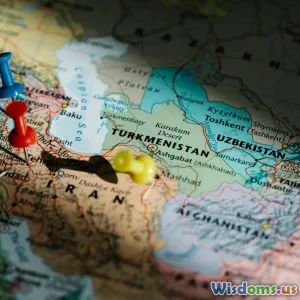
Why Solo Travel Makes You More Confident Than Ever
8 min read Discover how solo travel empowers you with unparalleled confidence through independence, overcoming challenges, and deep self-awareness. (0 Reviews)
Why Solo Travel Makes You More Confident Than Ever
Traveling alone has long been considered a daring endeavor, evocative of adventure and self-discovery. But beyond the romanticism lies a powerful truth: solo travel is one of the most effective ways to boost your confidence. Whether you're navigating an unfamiliar city, negotiating language barriers, or forging new social connections on your own, every challenge sharpens your self-belief and autonomy.
This comprehensive examination will explore how solo travel supercharges your confidence through independence, adaptability, decision-making, resilience, and ultimately self-awareness. Through real-world examples and scientific insights, you will understand why stepping out alone can transform your mindset and abilities more profoundly than many other life experiences.
Independence and Ownership of Your Experience
One of the most immediate ways solo travel boosts confidence is by placing you fully in charge of your journey. Without companions to rely on, the responsibility of planning itineraries, managing time, and making logistical decisions rests entirely upon you.
Making Decisions Alone Builds Trust in Yourself
Consider this example: a traveler in Kyoto must decide whether to explore a crowded shrine now or wait for quieter hours. On solo trips, such micro-decisions accumulate, reinforcing your ability to make choices confidently without external input. In a survey by Solo Traveler World, 87% of solo travelers reported improved self-confidence in decision-making after their trips.
Professor Susan Krauss Whitbourne, a psychologist specializing in adult development, notes, “Successfully navigating choices enhances self-efficacy—the belief in one’s ability to succeed.”
Learning to Manage Unexpected Situations
Whether it’s a last-minute train cancellation or losing your way in a foreign metro system, solo travelers must confront challenges head-on. This necessity fosters problem-solving skills and diminishes the fear of unfamiliar situations. A 2020 study from the University of Queensland showed that solo travel increases adaptability by requiring spontaneous thinking and resilience.
For example, when British solo traveler Sarah Stevens missed a connecting flight in Madrid, she booked alternative accommodations and reworked her itinerary independently, which boosted her conviction in her own resourcefulness.
Enhanced Self-Reliance and Resilience
Solo travelers embark on a path that requires unwavering self-reliance. This fosters a deep-rooted confidence stemming from overcoming various obstacles without outside help.
Building Emotional Strength Through Solitude
Unlike group travel, solo travel often involves spending extended time alone within an unfamiliar environment. While this can initially provoke feelings of vulnerability, it becomes a catalyst for introspection and emotional resilience.
Daniel Gilbert, Harvard psychologist and author of Stumbling on Happiness, explains that managing solitude effectively can reduce anxiety and increase one’s comfort with being alone in other aspects of life. Solo trips teach travelers to enjoy their own company, liberating them from external validation.
Practical Skills with Long-Term Benefits
Handling travel logistics, budgeting alone, and self-navigation are practical skills that boost confidence. These competencies often spill into daily life, leading to better time management, financial responsibility, and planning at home or work.
Maria, a solo traveler from Brazil, recounts, “After my solo backpacking through Southeast Asia, I realized I could manage my personal and professional life more confidently because I learned to trust my judgment while traveling abroad.”
Growth Through Social Challenges and Cultural Immersion
Travelling alone also challenges social comfort zones—another key confidence-building arena.
Overcoming Social Anxiety
For many, solo travel necessitates initiating conversations with strangers, asking for directions, or navigating cultural differences. Such interactions force travelers out of their comfort zones and sharpen social skills.
In 2019, a study published in the International Journal of Psychological Research found that solo travelers reported improved interpersonal skills and reduced social anxiety after extensive solo trips.
Deepened Cultural Awareness
Solo travelers tend to engage more meaningfully with local cultures, forging genuine connections that reciprocally enhance confidence. For instance, meeting locals during a home-stay or attending community events offers actionable proof that one can adapt and thrive anywhere.
John, an American who traveled solo through Morocco, shared, “When I successfully bartered at the Marrakech market and engaged in authentic conversations, my confidence in handling diverse people skyrocketed.”
Self-Discovery and Authentic Confidence
Beyond external skills, solo travel uncovers internal strengths that cultivate true, lasting confidence.
Embracing Vulnerability as Growth
Solo travel frequently exposes individuals to unforeseen hardships—missing luggage, language barriers, or cultural misunderstandings. Embracing vulnerability during these moments cultivates humility and emotional maturity.
As Brené Brown, a renowned vulnerability researcher, articulates, “Vulnerability is the birthplace of innovation, creativity, and change.” Solo travel is a practical arena for embracing vulnerability which nurtures confidence rooted in authenticity rather than façade.
Clarifying Personal Priorities and Values
Being alone in new contexts prompts reflection on what truly matters, enabling travelers to recalibrate priorities and develop clarity about themselves and their goals.
For example, choosing to spend a day volunteering with locals in Nepal instead of sightseeing might reveal deeper passions, strengthening conviction in personal identity.
Supporting Data and Stories
- According to Solo Travel Society, 92% of surveyed solo travelers reported increased self-confidence upon completing their trips.
- Author Cheryl Strayed credits her solo hike on the Pacific Crest Trail for helping rebuild her shattered self-esteem after personal losses, illustrating transformative power.
- Research in the Journal of Travel Research links solo travel with long-lasting increases in self-efficacy and optimism.
Conclusion: Take the Leap for Confidence
Solo travel is more than just an adventure—it's an empowerment journey that dismantles self-doubt and builds resilience, independence, and genuine self-confidence. From mastering logistics to embracing vulnerability, the layers of growth are profound and enduring.
If your goal is to transform your confidence and rediscover your capabilities, embarking on a solo travel journey is one of the most effective ways forward. The world becomes your classroom, and every step outside your comfort zone is a powerful affirmation: you can trust yourself to thrive anywhere.
So pack that backpack and take the first step—your most confident self awaits on the horizon.
Rate the Post
User Reviews
Popular Posts




















